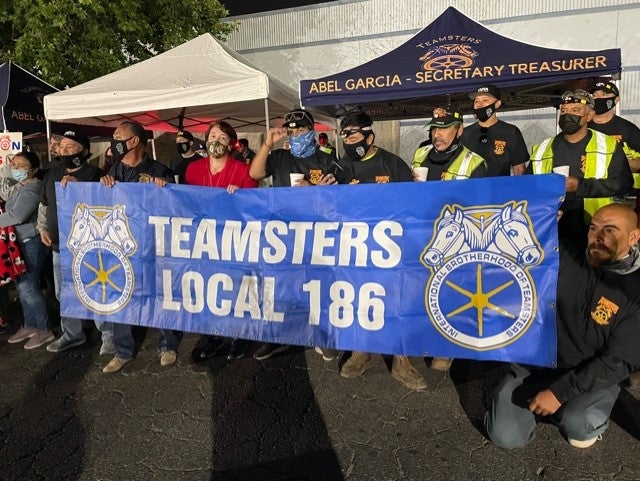The President of the Teamsters, Sean O’Brien, recently disclosed a disturbing interaction he had with Kamala Harris. According to O’Brien, when Harris met with the union’s leadership, her tone was not only dismissive but also bordered on arrogance. This surprising revelation might explain the unprecedented step taken by the Teamsters: declining to endorse any presidential candidate in this election cycle, a historic first since 1996.
O’Brien has pulled back the curtain on the union’s relationship with Harris, alleging that she blatantly dismissed their endorsement. Accustomed to truthful, fair dialogue, the Teamsters’ president was taken aback when Harris audaciously told him she didn’t require their endorsement, pronouncing confidently that she could ‘win with or without’ their support.
The Teamsters leadership had organized a sit-down discussion with Harris, aiming to broach several significant issues affecting their members. Candid conversation and mutual respect were expected; nevertheless, Harris’s alleged actions proved otherwise. Despite Trump thoughtfully answering all 16 questions posed by the union, Harris reportedly only responded to four.
O’Brien vividly remembered the disruption that occurred during the fourth question. Amid the conversation, a member of Harris’s staff surreptitiously relayed a note stipulating that it would be her last question. The Teamsters were certainly puzzled, and later, offended, by her hurried and unprofessional departure, which ended with her bold declaration: ‘I’m going to win with you or without you.’ This demonstrated a stark contrast to her competitor’s respectful engagement with the union.
In the aftermath of this unexpected meeting, a frustrated O’Brien reached out to other political contacts. Seeking some context for Harris’s dismissive attitude, he connected with Biden’s former secretary of labor with the intent of discussing the situation. Expressing his disbelief, he questioned, ‘Who does this lady think she is?’
Yet, his concerns weren’t limited to Harris. He was just as troubled about Biden’s candidacy, which he referred to as ‘kinda elderly abuse.’ According to O’Brien, he noted a worrying decline in Biden’s demeanor compared to prior meetings. This concern was further compounded by the implications such a decline might have for the country.
O’Brien recalled a past encounter with Biden where he painfully acknowledged: ‘We had Biden in there and you could just clearly tell he was not the man he was. It was kinda sad.’ His tone suggested the regret of watching a once vital political figure wither under the pressures of age.
Despite these potentially manipulative circumstances, O’Brien, with a hint of reluctant compassion, stated that Biden had once been an ally to workers. However, veiled within this nostalgia lay a stinging criticism of the current Democratic candidate and a worrying prognosis for his prospective presidency.
As a team, the union’s leadership concluded that they could not in good conscience endorse Biden or Harris for the presidency. This was a landmark decision that disrupted the tradition of alignment with the Democratic party. For the first time since 1996, the Teamsters chose to abstain from endorsing any presidential candidate.
The overwhelming sentiment gathered from a survey among the Teamsters’ 1.3 million members echoed their leadership’s stance. The results indicated that they stood firmly behind Trump rather than Harris, with an impressive 59.6% favoring Trump over the lackluster 34% for Harris.
This striking revelation from one of the country’s largest labor unions certainly raises eyebrows. The union’s decision not only reflects their discontent with the current Democratic candidates but is also indicative of a broader shift among its members. Favoring direct dialogue and respect, the Teamsters seemed confounded by the arrogance showcased by Harris and the weakened state of Biden.
A question arising from this landscape is whether these incidents were merely aberrations or indicative of a troubling trend in the candidates’ relations with American workers. Could the disrespectful behavior allegedly shown by Harris and the perceived frailty of Biden point to larger issues?
The Teamsters’ decision emphasizes the importance of understanding, respect, and valuing the stance and voice of American workers. Arrogance, as exhibited by Harris, and a noticeable decline, as seen in Biden, are not conducive to fostering strong relationships with one of the most influential organizations representing America’s blue-collar workforce.
Furthermore, it suggests a breakdown in the Democratic candidate’s ability to connect effectively with the working-class demographic. Their values, expectations, and welfare should be of utmost importance to any presidential campaign, especially one seeking to champion the rights and interests of these workers.
The revealing anecdotes shared by Sean O’Brien paint a distressing picture of the current state of Democratic leadership. It’s a picture characterized by apparent arrogance, dismissiveness, and an unsettling detachment from the realities of average American workers. One can’t help but wonder if these tendencies would persist if they were voted into power.
Overall, the Teamsters’ decision not to back any candidate for the presidency is indeed historic, making it all the more crucial to delve into the underlying reasons. The union’s significant departure from its traditional inclination towards Democratic candidates undoubtedly sends a stern message to the leadership of the Democratic party.


